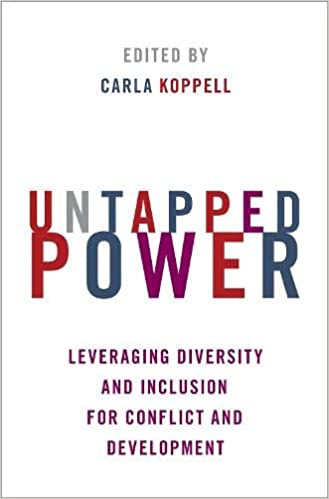Examining diversity, equity and inclusion is crucial for effective conflict prevention and diplomatic solutions, according to a new book titled “Untapped Power: Leveraging Diversity and Inclusion for Conflict and Development.”
The book, published Feb. 12, was edited by Carla Koppell, senior advisor for diversity, equity and inclusion in the Walsh School of Foreign Service and a Georgetown Institute for Women, Peace and Security distinguished fellow.
“Untapped Power” includes contributions from 40 authors, including scholars, policy makers, researchers and activists from around the world. The book covers a variety of topics including gender inequality, LGBTQ rights, disability rights and the liberties of ethnic, religious and linguistic minorities.
Koppell hopes that by reading the book, people can better understand the importance of diversity, equity and inclusion in global affairs.
“First, I hope that it makes a persuasive case to show that diversity, equity and inclusion issues are essential whenever you’re engaging globally,” Koppell said in an interview with The Hoya. “The second is that it gives readers an in-depth sense of how to approach these issues of equity and inclusion and the growing diversity of societies in ways that improve the effectiveness of interventions.”

Including diverse identities when practicing diplomacy is essential to creating successful solutions, according to Koppell.
“Fundamentally, diversity, equity and inclusion issues are always relevant,” Koppell said. “Whether we’re talking about how you negotiate a peace accord and who you think about both in terms of who needs to be at those negotiations, whose interests you need to serve, whose priorities need to be reflected in that accord, whether you’re talking about development and how you promote development in any sector.”
Claudia Escobar, an SFS centennial fellow who wrote a chapter in the book, said diversity is especially crucial in decision-making spaces.
“I would hope that readers will find material to be able to advance in the inclusion of vulnerable groups in the different decision-making spaces, especially in the institutions that promote development, human rights, and the rule of law,” Escobar wrote to The Hoya. “I believe that the book can be a tool to put the problems of discrimination of vulnerable groups in the discussion of the academic sector.”
Diversity is important in the judicial system which has historically not been diverse and therefore corrupt, according to Escobar, who previously worked as a magistrate for the Guatemalan Court of Appeals.
It is important to hold discussions on inclusion in academia, according to Madison Schramm, who wrote a chapter in the book author featured in the book and a professor at the U.S. Army War College
“Thinking about curricula–what types of research and by whom–are on the syllabus; thinking about how much value we give to work that centers historically marginalized populations; or how much of our understanding of the world centers on the experiences and perspectives of very few. We have a lot of work to do,” Schramm wrote to The Hoya.
Cementing diversity into discussions about security is integral to promoting peace, according to Teuta Avdimetaj, a researcher at the Kosovo-based think tank the Kosovar Center for Security Studies (KCSS) who collaborated on the book
“We already know that peace is more likely to last when women are part of peacemaking processes,”Avdimetaj wrote in an email to The Hoya. “The equal representation and participation of groups that have been traditionally left out at the margins of decision-making ensures that a broader range of issues and perspectives are accounted for in the peacemaking process.”
These issues are especially important because the absence of diversity in diplomacy can ultimately be harmful and dangerous, Georgetown Vice Dean of Diversity, Equity, and Inclusion Scott Taylor said.
“The exclusion of large populations, exclusions of certain peoples, usually leads to conflict,” Taylor said.
Taylor said diversity facilitates more peace in the world.
“When more people are at the table, when more viewpoints are represented, and more variety of people and citizens that make up the fabric of this country or another, are part of these conversations, that helps to facilitate more peaceful outcomes,” Taylor said.




















